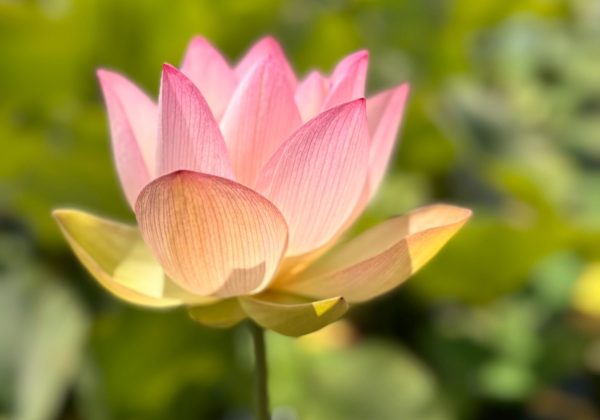Mahāpajāpatī Gotamī: The Founder of the Bhikkhuni Order
By Ven. Dr. Nivitigala Sumitta (Bhante Sumitta)
The story of Mahāpajāpatī Gotamī is a remarkable tale of compassion, determination, and the quest for spiritual equality. As the first woman to be ordained into the Buddha’s Sangha, she not only broke societal norms of her time but also laid the foundation for the Bhikkhuni Order, allowing countless women the opportunity to pursue the path of Dhamma. Her journey, spanning multiple lifetimes, is a testament to the transformative power of the Dhamma and the Buddha’s profound commitment to inclusivity.
Early Aspirations and Good Deeds
Mahāpajāpatī Gotamī’s journey did not begin in her final life as the Buddha’s foster mother. It traces back to the time of the previous Buddha, Padumuttara. Inspired by witnessing the Buddha appoint a nun to a foremost position, she made a significant personal sacrifice and aspired for the same role in a future life. This aspiration set the course for many lifetimes, during which she accumulated merit and practiced virtue.
In the countless lifetimes that followed, she was reborn among gods and humans, performing numerous acts of generosity and kindness. In one significant lifetime, she encountered a group of Paccekabuddhas, Independent Buddhas who live in seclusion and do not teach the Dhamma to others. When these Buddhas sought assistance from the people of the city to prepare for their Rains Retreat, they were initially turned down by the wealthy and powerful. Mahāpajāpatī Gotamī, then a humble slave, saw their need and took it upon herself to help. She organized a group of 500 female slaves to offer food and gather resources, while encouraging their husbands to provide the necessary labor to build huts for the Paccekabuddhas.
This act of generosity was significant not only because of the physical help it provided but also because it demonstrated a deep understanding of the Dhamma. It showed that true giving comes from the heart, regardless of one’s social status or wealth. These acts of selfless service bound Mahāpajāpatī and the 500 women karmically, setting the stage for their future rebirths and eventual entry into the Bhikkhuni Sangha.
Life as the Buddha’s Foster-mother

In her final life, Mahāpajāpatī Gotamī was born as the younger sister of Queen Māyā, the Buddha’s mother. After Queen Māyā passed away seven days after Siddhartha’s birth, Mahāpajāpatī took on the role of his foster mother. She raised Siddhartha with great love and care, playing an essential role in his early life and education.
When Siddhartha renounced his princely life in search of enlightenment, it was undoubtedly a moment of deep sorrow for Mahāpajāpatī. Yet, she understood the greater purpose behind his decision. Years later, after Siddhartha attained enlightenment and became the Buddha, her own spiritual yearning grew stronger. Her husband, King Suddhodana, also attained liberation and passed away, leaving her a widow. This profound sense of loss and her deep aspiration for spiritual growth led her to seek ordination from the Buddha.
Establishment of the Bhikkhuni Order
When Mahāpajāpatī first approached the Buddha with her request for ordination, the Buddha initially turned her down. This refusal did not deter her. Demonstrating the same determination she had shown in countless past lives, she shaved her head, donned a simple robe, and, together with 500 women, embarked on a long and arduous journey to Vesālī to seek the Buddha once more.
Venerable Ananda, moved by her dedication and the plight of the women, interceded on their behalf. After much perseverance, the Buddha agreed to establish the Bhikkhuni Sangha, setting forth eight conditions to ensure the order’s harmony and respect. This groundbreaking decision opened the doors for women from all backgrounds to join the monastic community, pursue the path to enlightenment, and uphold the teachings of the Buddha.
The Legacy of Mahāpajāpatī Gotamī
Mahāpajāpatī Gotamī’s ordination was not just a personal victory; it was a revolutionary act that forever changed the spiritual landscape of Buddhism. By ordaining women, the Buddha made a powerful statement that the path to enlightenment was open to all, regardless of gender or social standing. Mahāpajāpatī became the first bhikkhuni, leading the way for countless women to follow in her footsteps.
Her legacy extends beyond the establishment of the Bhikkhuni Sangha. She went on to attain Arahantship, embodying the potential for spiritual liberation that lies within each individual. The verses of the Theri Gāthā, composed by enlightened bhikkhunis, reflect the wisdom and insight of these women, demonstrating that their spiritual achievements were on par with those of their male counterparts.

Conclusion
Mahāpajāpatī Gotamī’s life is a shining example of courage, determination, and unwavering commitment to the Dhamma. Her journey from a devoted foster mother to the founder of the Bhikkhuni Order shows the transformative power of the Buddha’s teachings and the inclusivity he envisioned for his community. Through her efforts, countless women have been given the opportunity to pursue spiritual liberation, making her legacy one that continues to inspire and guide us today.
As we reflect on her story, let us honor the path she laid out for the Bhikkhuni Sangha and recognize the profound impact of her contributions to Buddhism. Her life reminds us that the journey to enlightenment is open to all who have the courage and determination to walk it.
References
- Therigatha: A collection of verses attributed to the elder bhikkhunis, offering insight into their spiritual journeys and wisdom.
- Mahavamsa: An ancient Sri Lankan chronicle that provides historical context to the Buddha’s visits and the establishment of the Sangha in Sri Lanka.
- Buddhist Texts and Commentaries: Accounts of the lives and deeds of the Buddha’s foremost disciples, including Mahāpajāpatī Gotamī.
- Anguttara Nikaya (AN 1.5.1): A section of the Pali Canon that references Mahāpajāpatī Gotamī as the foremost of the senior nuns.
- Buddhist Stories and Traditions: Various suttas and traditional accounts detail Mahāpajāpatī’s journey and her significant role in the Buddha’s life and the formation of the Bhikkhuni Sangha.



